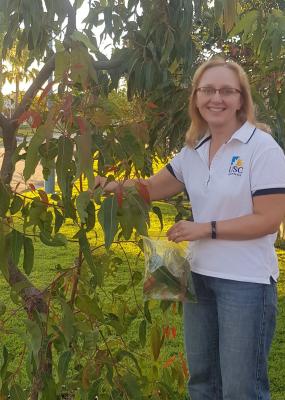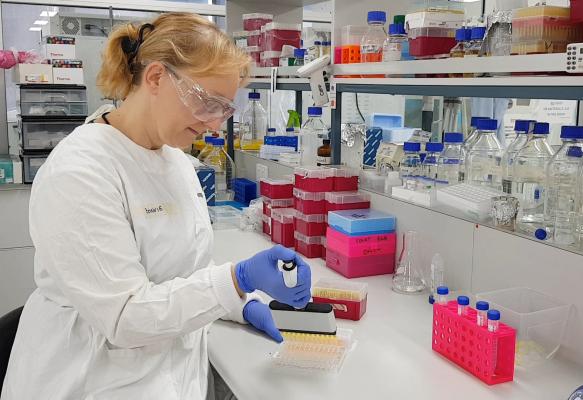USC researchers hope a natural antiviral medicine found in the leaves of eucalyptus trees in South East Queensland could be a game-changer in treating a serious virus infecting Australia’s koala population.
While antibiotics are available to treat chlamydial infections in koalas, there are currently no treatment options available to manage the koala retrovirus (KoRV), a disease that is particularly prevalent in the south east of the state.
In a collaborative project, funded by Gympie Regional Council, researchers tested leaves from 16 eucalypt species from the Gympie area for natural antiviral activity and found some have the potential to inhibit retroviruses.
USC Research Fellow Dr Bonnie Quigley said while the results were preliminary, the project represented the first step in a journey of natural drug discovery by finding koala food sources that could contribute towards a treatment for KoRV.
“The first hurdle has been cleared – local eucalyptus species with potential antiviral activity have been identified. This represents a significant step forward in developing natural and sustainable treatment options for one of Australia’s best-loved animals,” she said.
Eucalyptus leaves are the main food source for koalas. However, this research has established that not all species have the same antiviral potential.
“Some local species may have more promise as natural antiviral medicines than others,” Dr Quigley said.
Along with chlamydia, the koala retrovirus poses a serious threat to the long-term survival of the marsupial and has been strongly linked to koalas developing cancers such as lymphoma and leukemia.
Dr Quigley said the second stage of the project would include following koalas before and after they eat a naturally “antiviral-rich” eucalyptus diet identified in this study compared to a naturally “antiviral-poor” diet.
“This will allow us to see if the levels of koala retrovirus change between food sources,” she said.
“Chemical testing will be used to identify the specific molecule or molecules responsible for the antiviral activity in the leaf samples, and more eucalyptus trees will be tested to ensure the antiviral activity detected is widespread in plant populations.”
The collaborative project team from USC Genecology Research Centre includes Dr Quigley, Professor Peter Timms and Dr Sharon Nyari who are also working on a vaccine for koala chlamydia and KoRV, and plant biotechnology researchers Associate Professor Steven Ogbourne, Dr Trong Tran and Dr Ton Stewart.
Western Sydney University chemical ecologist Dr Ben Moore and Gympie Regional Council’s Environmental Planning Officer Paul Sprecher also collaborated on the project.









